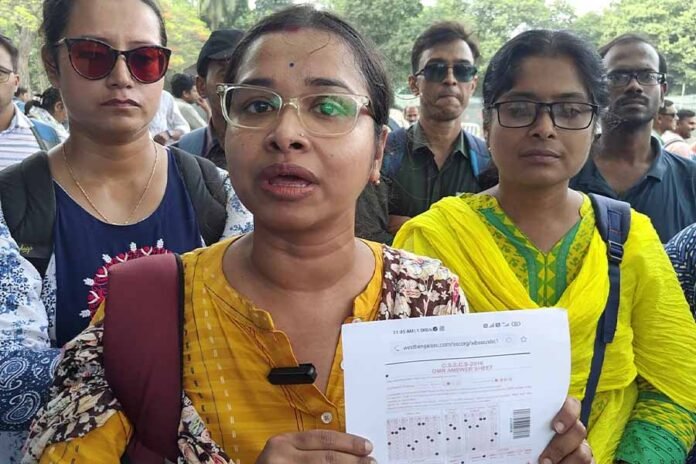The Supreme Court of India has quashed the controversial selection of 25,752 school staff in the state, deeming the recruitment process to be “tainted.” This landmark judgment has brought to light serious concerns over the transparency and fairness of recruitment procedures, sending a strong message to educational institutions and authorities about the importance of conducting appointments in an unbiased and transparent manner.
The Background of the Case
The controversy dates back to 2021 when the West Bengal School Service Commission (WBSSC) conducted a recruitment drive to fill thousands of vacancies for teaching and non-teaching staff in state-run schools. The recruitment process, which was expected to bring in qualified and deserving candidates, soon became embroiled in allegations of corruption, favoritism, and manipulation.
Candidates and opposition parties had raised concerns about irregularities in the recruitment process, accusing the authorities of accepting bribes in exchange for jobs. Reports suggested that a large number of candidates who were not fully qualified or failed to meet the necessary eligibility criteria were appointed to various positions, while deserving candidates were left out. The recruitment was also criticized for lack of transparency, with reports of forged documents, backdoor entries, and biased decision-making processes.
The Legal Battle
The issue was brought before the Calcutta High Court, which ordered a review of the recruitment process. However, the state government and the WBSSC defended the appointments, maintaining that due procedures had been followed. As the case progressed, new revelations and investigations surfaced, adding fuel to the growing fire of controversy.
In 2023, the matter reached the Supreme Court, which decided to take up the case for a final ruling. The apex court carefully examined the allegations and evidence presented, which pointed to a series of lapses, including the manipulation of the selection process and the selection of candidates with dubious credentials.
The Supreme Court, in its judgment, emphasized that the integrity of the recruitment process was crucial for maintaining trust in the educational system and ensuring that only the most qualified individuals were appointed to positions of responsibility in schools. It concluded that the selection of the 25,752 candidates was “tainted” and ordered that their appointments be canceled.
The Court’s Judgment: A Game-Changer
In a ruling that could have far-reaching consequences for recruitment procedures in educational institutions across the country, the Supreme Court made it clear that the selection process for government jobs must be conducted in an impartial, transparent, and fair manner. The judgment effectively nullified the appointments of the 25,752 individuals who had been recruited through the allegedly flawed process.
The Court’s decision also included a directive for the state government to initiate a fresh recruitment drive, ensuring that it adheres to the principles of transparency, fairness, and merit. The state government was also instructed to conduct thorough background checks and verification of candidates’ qualifications before finalizing any appointments.
Furthermore, the ruling stated that those responsible for orchestrating the fraudulent recruitment process must face legal action. This includes school officials, recruitment commission members, and others who were found to have facilitated the corrupt practices. The Court’s judgment is seen as a firm step towards curbing corruption in public recruitment and ensuring that future selections are based on merit and fairness.
Political and Public Reaction
The verdict has stirred strong reactions from all quarters, particularly from political leaders and educators. Opposition parties, which had been vocal in criticizing the recruitment process from the very beginning, have hailed the Supreme Court’s decision as a victory for justice and fairness. They have demanded that the responsible officials be held accountable and that similar irregularities in other recruitment processes be investigated.
On the other hand, those who had been appointed under the controversial process have expressed disappointment and concern. Many of these individuals, who have been working in schools for years, are now facing the uncertainty of losing their jobs. Some have also questioned whether they were unfairly targeted for something they were not directly responsible for.
Educational organizations and associations have also weighed in, stressing the importance of ensuring that future recruitment processes are not only transparent but also sensitive to the hardships faced by those caught in such controversies.
Implications for Future Recruitment
The ruling has significant implications for recruitment practices, particularly in the education sector. It reinforces the need for strict monitoring and oversight of recruitment processes to ensure that they are conducted with integrity. The judgment could lead to a reassessment of how recruitment bodies and state agencies handle appointments, particularly in high-stakes fields like education where the future of thousands of students depends on the quality of staff hired.
Moreover, the verdict underscores the importance of merit-based recruitment, ensuring that all appointments are made according to established criteria and standards. The ruling also highlights the role of transparency in the recruitment process, suggesting that any attempts to bypass established norms or manipulate results will be met with strict legal consequences.
A Wake-Up Call for Recruitment Systems
The Supreme Court’s decision to quash the appointment of over 25,000 school staff in West Bengal sends a clear message that no one is above the law, and any attempt to corrupt the recruitment system will not be tolerated. While the ruling is a significant victory for transparency and fairness, it also raises crucial questions about the accountability of recruitment bodies and the measures that need to be implemented to prevent such lapses in the future.
As the dust settles on this case, it is clear that this landmark verdict will have a lasting impact on the recruitment processes in West Bengal and could potentially serve as a model for other states and government agencies looking to restore public trust in their hiring practices.

